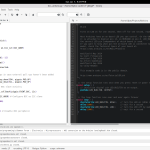Previous: Day 4 – Motor Controller
These are the requirements for the robot’s power supplies:
1. Motors will need at least 1.5V power per motor and the amperage would depend on the power of each motor. We used a remote 7.2V remote control car batterry which is converted to 5v, so it could feed the motor board as well. However with multiple servos attached the 3A may not be sufficient. There are a few good products such as UBEC 6V 6A which will convert any high DC voltage to workable 5V or 6V which will cost you between $5-$15 depending on where you live.
2. The motor controller board can share power with the motors. Anything big enough to supply 5v constantly is good. The motor controller would need 2 inputs. One for the power, the other for the logic. The logic requires a regulated power supply.
3. Additional peripherals such as the gripper would require another 3-5 volts and could take around 1A each servo during heavy loading.
4. The Pi itself would require 5V and 1A input. This should be separated with power for the motors, because sudden surge could effect the processor performance, so this should be as consistent as possible. The Pi could use a dedicated Power Bank with 5V 2A juice.
5. Typical 7.2V NiHM or 2S LiPO battery for Remote Control cars will usually be enough to power motors and servos through a UBEC.
6. You can attach and solder your own connector to match the battery head.
Next: Day 6 – Sketch
[post_view]

